Pretty In Pink: 1959 Plymouth Fury Hardtop
I wish I could include a sound clip of George Thorogood’s, “Bad to the Bone” with this post as this is a ’59 Plymouth Fury Coupe in faded red (or pink) as the listing claims. I know, the vengeful car from Stephen King’s horror novel/movie, “Christine” was a ’58 but we’re not talking much of a difference here and the color is close enough. Plus, doesn’t she look pretty in pink? This Christine is located in Portland, Oregon and listed here on Copart for auction with a current bid of $10,100, reserve not met, or a minimum offer of $19,000. Thanks to reader Desmond Gonzalez for the tip.
This Plymouth is in full tail fin regalia to compete with others of its birth year like the Chevrolet Impala (horizontal fins) and the Ford Galaxie, (vertical fins), but considerably more moderate in its “finage” excesses. Nevertheless, the ’59 Fury just isn’t as common as the competing Chevrolet and Ford models are. This design was completed near the end of chief stylist, Virgil Exner’s reign. Mr. Exner left Chrysler Corporation in 1957 but his team stayed on a bit and obviously cars are designed several years into the future. True to form, this Fury has the Continental spare tire cover, a.k.a. the toilet seat trunk lid.
It is hard to grasp this Fury’s overall condition from the accompanying images. The odometer is showing only 83,000 miles, seems plausible or is it 183,000 perhaps? No mention if it continually rolls backward like the movie car…..
The description for this Fury is very light, it is mostly a pictorial. What can be determined is that the engine appears to be a 318 CI Polysphere V8 good for 230 horsepower. Behind it is an automatic transmission but no reference as to whether it is a two-speed Powerflite or a three-speed Torqueflight. Either transmission is push-button controlled. And based on the start-up and driving instructions, it sounds like this one could kill you if you aren’t careful. Apparently, there is no parking gear, so make sure to not be standing in front of it when it starts!
The interior needs some help as the front seat is split wide open. The rest of what’s visible looks OK; the carpet appears to be faded but intact. Pink and black door cards just scream 1959 – is that a power window switch that I see on the driver’s door? The typical back seat looks barely used.
There is no mention of corrosion or body integrity, so we’ll have to rely on what’s visible; there is no evidence of rust, holes, etc. The rocker panels, doglegs, lower fenders all look clean!
Decoding the VIN tells us what we already know but adds that this ’59 rolled off of ChryCo’s Los Angeles assembly line (fourth character=4). I am surprised to find this complete a car at Copart as that is where, generally, damaged cars go to die – I know from experience having had to send a couple there for mishaps. It’s especially heart- rendering when you realize that twenty-three 1958 Fury’s were consumed in the making of “Christine” so it’s great to see this very similar ‘59 intact and ready to go on to new life. Short of a complete restoration job, this is the best original one of these from this era that I have seen – any interest on your part?
Auctions Ending Soon
 1971 Ford Mustang Mach 1Bid Now3 hours$7,100
1971 Ford Mustang Mach 1Bid Now3 hours$7,100
 2003 Porsche Boxster SBid Now4 hours$6,500
2003 Porsche Boxster SBid Now4 hours$6,500
 1966 Lincoln ContinentalBid Now6 hours$500
1966 Lincoln ContinentalBid Now6 hours$500
 2000 Jaguar XJ8LBid Now4 days$1,250
2000 Jaguar XJ8LBid Now4 days$1,250
 1977 Datsun 280ZBid Now5 days$275
1977 Datsun 280ZBid Now5 days$275
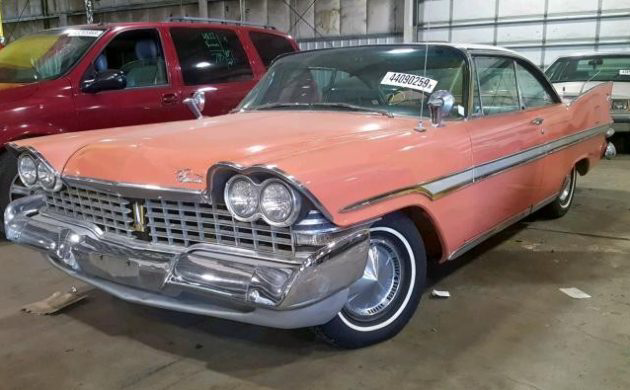

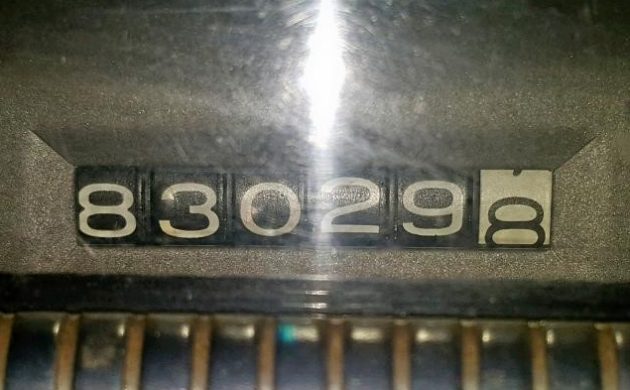

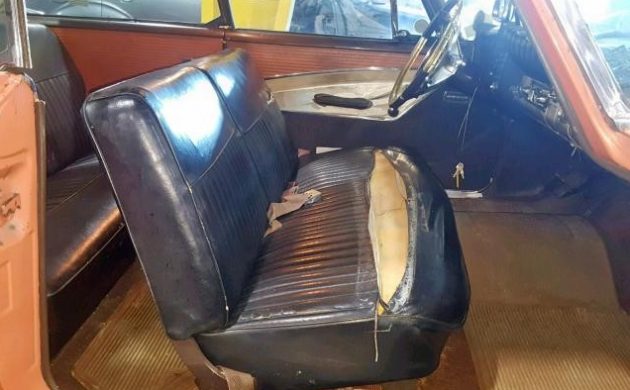
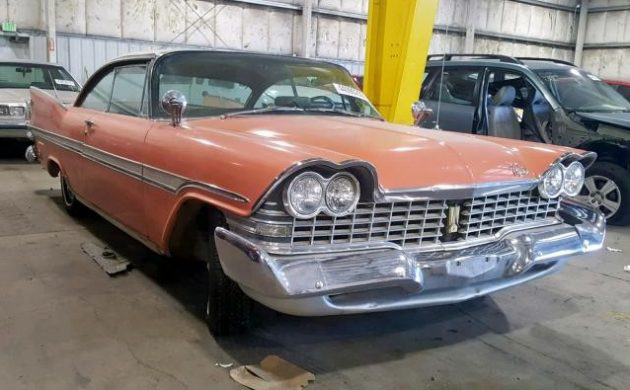
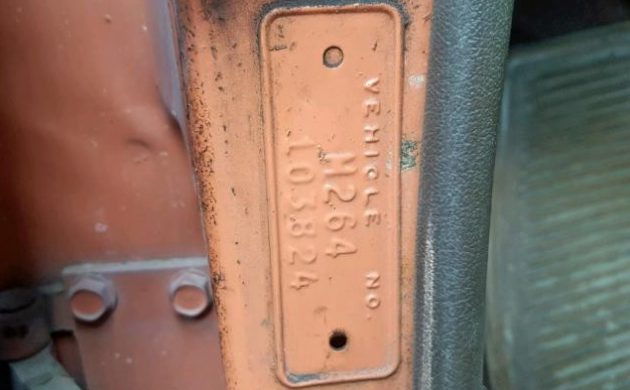

Comments
Nice car to drive as is or a beautiful restoration, not faded red or pink,more like a faded salmon.
These are hard to find that isn’t badly rusted. I like it.
Jim, there is a huge difference between the 1958 and 1959 models and they were not pretty differences.
Love the cars of this era, I could never get ‘the hang’ of the forward sloping tail fins on the Plymouth, everything else sloped backwards except these, always looked kinda ‘odd’ compared with the rest, but still definitely ‘OLD SCHOOL KOOL’, love it !
Backward-sloping tail fins….Brad, can you give us an example?
Rex, look at the fins on most cars of the era and the fins always came to a sharp point at the tops, the point was always sticking out further than the bottom, the Plymouth was opposite, the base is further back than the top point, check the pics on this one. If you weren’t careful you could impale yourself on the 59/60 Caddys, Chryslers, etc. I think Plymouth was the only one that didn’t come to a sharp point at the top rear. The back vertical edge slopes forward all others sloped backwards.
I love it. How in the world does a car like this end up at Copart? Mind boggling.
Grab the polish and the wax, add a new front seat cover and carpeting and go cruising in style.
Does it look like this has been hit at one time – – -check beside the vin tag in the picture. Not sure what I’m looking at but looks distorted.
Car has lots of potential and a 318 is just fine – – had a buddy had one in a 2 dr sedan and got good mileage and scooted down the highway just fine.
Everybody doesn’t need a big block to fill their dream.
I think you might have the wrong date for Exner leaving Chrysler. I think it was closer to 1961 or 1962. Small point I know, but this car is firmly in his range.
Personally I find the ’58 to look better, but it’s still a nice 50s Mopar. Seemingly nice condition and cool design – HORRIBLE color!!
CORRECTION: Virgil exner didn’t leave Chrysler in `57; that was the height of his styling career. He left after having a heart attack in 1960, and a power struggle for Chrysler’s helm started. One President didn’t last a year. Those were tough days for the brand, indeed.
All hail Virgil Exner!
Ours was beige w/white top. 👍
This color combo MAKES this car…. a true 50’s classic!!
Colors on cars are, of course, very subjective. Some folks like red and others wouldn’t have it if the dealer cut the vehicle price by 40% but today’s selections are just plain drab from most car manufacturers. The cars from the 50’s and 60’s lent themselves to bright colors, two tones and even tri-tones and to me, they looked terrific. I think that era was also forward thinking after the war and the future looked promising, so boldly forward, everyone went. Today, looking at almost any manufacturer’s color charts and all one see are tons of drab grays, dark blue’s that look black, one metallic white, perhaps a muted red…boring and for me, uninspiring. Mazda offers a nice optional cost metallic red but what happened to Mercedes great “Brilliant Red” color. Thank goodness Porsche still has a wonderful color palette from which to chose. Their “Miami Blue” is a show stopper, although checking that particular color box will empty your wallet by $3.250…although, once you see that car color in person, it may become absolutely worth it. If not, Guards Red, Racing Yellow, White and Black are no charge. lol
Agree with you totally on the colors and the choice so many car makers did back in the day, I personally like the two and tri tone paint schemes that were out there for all the world to see. All todays jelly bean cars look the same but just a different drab color.
This nice old Plymouth with the odd fin configuration and the flat trunk top fake continental kit is one nice car, and one I would like to have in my garage today! This Plymouth color from the factory was called “Sunset Beige”, I like to call it sort of a Coral in appearance. Looks like some of the GM car colors of the 50’s.
Beauty is in the eye of the beholder… I bought my 1st car when I was 13. It was a ’59 Plymouth Sport Fury Convertible, Gold with a tan top. While not the best looking car, to me it was gorgeous!
John, I think the car itself looks nice, but those horizontal tail lights don’t do it for me. They look odd on that rear end.
Has the superpak (4-bbl) air cleaner, so equipped good for 260HP. Most 318 automatic 59s were Torqueflite. Powerflites were more common with the inline flathead six. Also notice the optional dual antennas, sport deck (deck lid) treatment and front bumper wing guards. Overall, a decent car.
Most colors on today’s vehicles are drab, but thank goodness my 2017 Dodge Challenger GT has the ‘Go Green’.
I may refer to it as subdued but it stands out and gets positive reactions and smiles from all ages (4 year olds to 84 year olds).
Good on you. My next Challenger will be that color. I always wanted a 70’s model in that color but will never be able to afford one. That way I can come close.
They had a restored one of these (in a copper color) at this year’s Mecum Monterey auction — out of the hundreds of cars there, it stuck in my mind because 1959 Chrysler products are just so rare to see. In a sea of GM products from the same year, a Plymouth really makes an impression.
I can’t say this car’s salmon color would be my first choice, but it certainly contributes to this car’s unique late-50s style.
Estates now run cars through CoPart….its an auction place ya know.
Nice old Plymouth in a sea of Chevys and Fords, good to see something different for a change. Did you see where COPART puts an estimated retail value of 43 K for this car, I think that is rather high ? I’d like it for 7 to 8.5K . Great car for a mild 440″ transplant with the normal restomod accoutrements.
I thought Bin was 19 grand according to posting.
Lovely non rusted one.
Love those 50s colors.
This does not need a 440. That big block 318 Poly will roll this out just fine, especially if as someone mentioned its a 4bbl carb . The torque these Poly 318s had is unbelievable unless you have driven one.
As a nine year old I was awed by my
best friend Sandy’s mother’s new 57 Belvedere four door hardtop in the same salmon with a white top. I got to ride in it! Sure was prettier than our black 52 Chevy.
What a cool car! We had a 57 Belvedere growing up, my Dad traded in his 50 Studebaker Champion convertible. While I remember a lot of cool things about the car, the push-button trans, the dash mounted rear view mirror, the “hand grips” on the steering wheel, the hub caps were the best. Before the popularity of chrome reverse wheels, which pre-dated “mag” wheels, the 57 Plymouth were the caps that all the hot rodder’s wanted, we lost numerous sets!
Copart runs much more than insurance totals through their auctions. Any private seller can use Copart as well. Lots of the charities that accept cars for donations in exchange for tax write-offs use Copart as well. Estates use them too. Some auctions are listed as offsite, which means the car never enters the Copart yard. It’s pretty much eliminated a lot of the smaller car auction operations in my city.
What would be the danger of standing in front of it when it starts? Lots of cars didn’t have a park position in the 50’s, but they all had neutral safety switches.
Correct: Neutral safety switch was a standard safety feature on the cast iron and aluminum pushbutton torqueflite.
My dad made a little panel with I believe was a door bell (round) that was attached just under the pushbuttons, I remember you had to push the button while cranking, it likely was a bypass for a broken neutral safety switch. Another vehicle that didn’t have a park position was the Corvair.
True JOHN, I just bought a Corvair, learning more about it everyday. Really like it a lot.
Cars back then had emergency brakes THAT YOU USED!
normadesmond, sorry to contradict you but they were never designed to be an ’emergency brake’, they were purely a ‘parking brake’ that you applied after you’d stopped to prevent it from rolling away. If I slammed on the parking brake with my foot on my 1962 Imperial in an emergency today it would probably destroy the drive shaft and universal joints, a small brake drum is mounted on the shaft behind the transmission, it’s only a ‘parking brake’ nothing more, also how do you ‘feather’ a foot operated brake pedal that latches full on as soon as you step on it? My 2006 Chrysler 300C Hemi is the same but at least it has a transmission ‘park’ position, the early 727 transmissions didn’t have that until 1963. They all have a ‘parking brake’ even today, none were ever designed as an ’emergency’ brake! If there’s a hand operated lever type brake it’s called a ‘hand’ brake not an ’emergency’ brake, all British cars had them and still do !
You’re right. I think it may have been referred to as the “emergency brake” by my mother & that’s why it comes out of my mouth. Tis the parking brake.
And that is what held a car in place.
Yeah, for some reason everyone now calls them an emergency brake, it’s something that has evolved over time but it was never designed or intended to be used as one. My first car’s brake didn’t work so I carried a house brick around with me and stuck it in front of a wheel.
Beautiful car and btw, Exner became Vice President of Styling at Chrysler in ’57 and was fired in ’62.